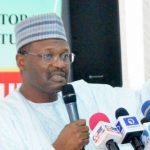Opinion: G.G. Darah, the North and Resource Control
Articles/Opinion, Latest Headlines Wednesday, July 30th, 2014
By Damola Awoyokun
It is the patriotic duty of every Nigerian to dance on the grave of General Sani Abacha. Contrary to the Levickian PR his supporter Prof G.G. Darah did for him in his article Dancing on Abacha and Yar Aduas’ Graves (The Guardian, 17-18th July 2014), Abacha remains the most despicable leaderNigeria ever had. He killed Ken Saro Wiwa and the Ogoni 8, he killed Pa Alfred Rewane, Kudirat Abiola, Suliat Adedeji, Rear Admiral Olu Omotehinwa, Dr Omatshola, Musa Yar Adua, Madam Tinubu while others like Alex Ibru and Pa Abraham Adesanya were his near-misses. Countless students whose name we don’t even know were massacred while standing up for the democratic ideals of June 12. We pay tribute to Wole Soyinka, Anthony Enahoro, Gani Fawehinmi, Beeko Ransome Kuti, Frank Kokori, General Akinrinade, Hassan Kukah, Olisa Agbakogba, Ayo Obe, Chima Ubani, Dan Sulaiman, Kayode Fayemi, Emeka Anyaoku, Femi Falana, Sola Adeyeye and some of our finest and fearless journalists and editors still around today: Odia Ofeimun, Nosa Igiebor, Chris Anyanwu, Babafemi Ojudu, Kunle Ajibade, Bayo Onanuga, Dapo Olorunyomi, Akin Adesokan, Ogaga Ifowodo, Niran Malaolu, Osifo-Whiskey, and others assassinated like James Bagauda Kaltho. These illustrious Nigerians formed the minds of my generation and made it impossible for us to believe lies. Today, Nigerians should hug themselves with tears of joy and say, yes, we survived that evil monster. Yet, that is the person that is worthy of ovation and reverence in Prof G.G. Darah’s value system. Our primary problem as a nation is not the lack of memory but an addiction to perverse values, diseased morality and gutter sense of human decency. Once the value system which is the DNA of any society is allowed to corrode, all other things fall apart.
The onset of the American Civil War led to the rise of Northern Nigeria. Cotton was the oil of the 19th century. Great Britain the world’s most industrialised nation then relied on America as its biggest supplier. The cotton industry based in Lancashire was the second biggest industry after agriculture offering employment to 3 million Britons. The huge wealth derived from cotton production was the reason America’s southern states held on to slavery even when other western nations had abandoned the evil. Then came the civil war which disrupted supplies. The Lancashire business group had to look for cheap alternatives. Through the “bible and plough” policy of the British missionaries, jungles around Abeokuta rapidly began to make way for cotton fields. When America re-entered the supply market in 1870, the world prices of cotton crashed to pre-war levels and that checked the cotton expansion in “Southern Nigeria.” The British Cotton Growing Association (BCGA) did not give up on diversification of suppliers though.
In 1905, backed by the BCGA’s reconnaissance report, Winston Churchill an MP for Lancashire reported in the House of Commons that Northern Nigeria had been discovered to offer a reliable and rich production of cotton. Investment there must therefore be allowed to proceed. But the only problem was the absence of mechanised, business-friendly and export-compliant transportation network. In one of his autobiographies, The River Warabout the conquest of Sudan in 1898, Churchill recounted being awed by a Canadian Lieutenant in his ‘Railway Battalion’ who knew the strategic importance of railways and knew to the last detail everything about their design and construction at minimal cost. This young lieutenant documented them in “ponderous volume several inches thick; and such was the comprehensive accuracy of the estimate that the working parties were never delayed by the want even of a piece of brass wire.” Since then Churchill had it in mind that this young lieutenant, Percy Girouard described elsewhere as “a blend of French audacity of imagination, American ingenuity and British doggedness in execution” would do great things for the Empire. Lugard may be a great military strategist and an indefatigable administrator but he was not exceptional as an engineering director. So in 1906 when Lugard as the Governor of Northern Nigeria submitted proposals for “Continuous Administration,” by which he would still be able to govern his protectorate even when he was out of the country for a long time, Churchill as the undersecretary for Colonies rejected it and Lugard resigned in September. As the Yoruba say, eni ti a fe sun ni ina to tun fi epo para, 2 ge 4 [He whom we plan to roast alive is even beautifying his own skin with petroleum jelly. Ride on].
In the Commons when Churchill was asked what kind of financial stress a huge railway network to connect a region bigger than the size of France and Italy put together was going to inflict on Britain’s budget, he replied: “The cost of the railway extension at present authorised will be met by Southern Nigeria, so that the British taxpayer will not be affected” (Hansard, 19th December 1906). Sir Percy Girouard came in and delivered the 366 mile Baro-Kano railway line at £3,800 per mile – half the price of Lugard’s projection. In 1912 with his proposals for Continuous Administration accepted, Lugard was brought back from Honk Kong to deliver access to the sea with frictionless fluency by amalgamating the two independent countries. What we call colonisation was to Britain business opportunity.
The railways were fine, the weather cooperated, the Sultan of Sokoto and Shehu of Borno had pledged their loyalty, cotton was blooming in Gusau and Funtua the same way they blossomed in Mississippi and Alabama, Tin had been discovered in Jos, groundnuts, tobacco, ginger, hide and skin had been added to the mix, what followed was 50 years of aggressive and unbridled “business opportunities.” The figures leapt for joy. From 200 tonnes before the railways, groundnut export shut up to 41,000 tonnes in 1915. In 1949, a year after the North was amalgamated legislatively with the South, 10 tonnes of cotton and 378,000 tonnes of groundnuts were exported compared to 103 tonnes of cocoa from the South. By 1961, the North was responsible for 37.8% of world’s supply of groundnuts. In 1963, groundnut exports soared to 650, 000 tonnes fetching the Northern marketing board a cool £46million. The booming northern economy also generated an ultra-wealthy rich class. In the mid twenties, Alhassan Dantata swiftly replaced Southern money men like Captain Labulo Davies, Alli-Balogun, J.H. Doherty, William Akinola Dawodu, Braimah Igbo, J.K. Coker, Karimu Kotun as the richest man in the country. When UAC, a subsidiary of Unilever which controlled 80% of Nigeria’s exports started out in the North, they needed someone who would go around to the farmers and buy their products and encourage them to grow more and more cash crops needed in Europe. They found Dantata, a small time but willing trader and made him their agent. All those iconic pyramids of groundnuts by railway lines which were the towering symbols of North’s wealth were the hard work of Dantata.
All that changed in 1966. From an economic giant, the North became a welfare case. When farmers harvest their groundnuts or cotton or hides and skin, they take them to the middlemen or directly to nearest UAC or John Holt warehouses for cash. The top staffs of these companies were British while the record keepers, warehouse supervisors were mostly Igbos. Also due to literacy differences, clerks of the civil service, post and telegraph operators, electricity corporation’s maintenance technicians, the water treatment workers, foremen of construction gangs were mostly Igbos. Those who drive the trains, service train engines, give train signals and the train stations supervisors were mostly Igbos. Laird, Britain’s deputy high commissioner in Kaduna wrote of Northerners who could have held these jobs: “They seem to have little desire to improve their way of live…Any money left after paying their taxes is spent on purchasing a new wife or new bicycle…”
Then it started on 28th May 1966. Based on a flawed estimate of ordinary Igbos’ culpability in the coup of January 15 and Ironsi’s handling the affair, then began a systematic effort to ensure every Igbo in the North that was not dead must be made afraid to stay. It mattered less that most of these Igbos were born and bred in the North and do not have residences in the East. Up to 2 million fled. Even those that were working on Kainji dam project were quickly airlifted to Ogbomosho when report came to Impregrelio, the Italian civil engineering giant that the murderous yaniska (sons of wind) were mobilising with fanatical ferocity in Minna ready to storm the construction site and dispossess it of every Igbo worker. According to archived records, 50 were killed and 900 safely evacuated. The Briton who was the engineering supervisor of the Zaria train depot said he witnessed one of his own train mechanics murder 5 of his co-workers because they were Igbos.
When the dust settled, it was discovered farmers who managed to haul their harvests to the warehouses could not sell them because the trains were not working. Charles Dymond, the Commercial Counsellor at the British High Commission in Lagos travelled to the North to survey the extent of the of the damage. When Lugard sewed up the country and became the governor-general, instead of governing from Lagos, he governed from the North because he had the dream that with effective management, the North could be what India was for the Empire. Dymond saw that dream in tatters as he surveyed the place from 2 – 13 October 1966. Then the civil war came and after it, instead of going back to the status quo, Petroleum decree No 51 brought a new source of easy money more stupendous than reliance on agriculture. While the American Civil war led to the rise of the North as an economic giant, the Nigerian Civil war ended it.
Wrote G.G. Darah: “It was the Gowon-Awolowo diarchy that abolished the derivation principle and funnelled all the revenue to the ravenous central government under the guise of depriving the breakaway Biafra Republic of 1967-1970 of funds to prosecute the civil war.” This is incorrect. The Petroleum Decree was signed on 26 November 1969 29 months into the war and roughly a month before it was over. The war according to West Africa Magazine of 19th October 1968 was funded with sales of gold and silver jewelleries donated by Biafran women, donations from Igbo communities aboard, reserve currencies from two regional branches of Central bank, international aid diverted into arms purchase, sale of palm oil, war bonds and most importantly, cash loans and arms from the Charles De Gaulle’s Government. In October 1968, another $12million was deposited in a Moroccan bank awaiting Biafran emissaries to arrive to pick it up. Oil money was not used to fund the war even though without it Biafra would not have contemplated secession and the Federal Government would not have done so much to defeat the secession. For instance, Adekunle’s battalion which later became Third Marine Commando Division was not tasked to go and win the war, that was for Danjuma’s First Division or Murtala Mohammed’s Second. Adekunle was tasked to deprive the Biafrans of access to the sea, liberate the oil producing regions and secure oil facilities so that the oil companies will know who should have the next royalties. After the Battle of Bonny of 25th July 1967, he radioed Lagos that all the 3.9 million cubic metres in 16 tanks at the Bonny oil terminal were recaptured without damage. Gowon was reported to be ‘overjoyed.’
The Petroleum Decree was promulgated in November 1969 because 1970 was a year of pay since royalties were paid every 3 years then. (Even Biafran war bonds had 1970 and 1973 maturity dates). The pay was for the Federal Government and the Eastern Regional Government as usual. But since the last pay, the Eastern Region had been broken up into Eastern Central state with no oil and Rivers and Cross Rivers states with all the oil. The Decree then routed all the revenues from territorial areas and continental shelves to the Federal purse. What that eventually created was the dictatorship of the centre. Whether the country was under democratic regime or military junta, federalism or regionalism, Nigerians were chained to the dictates of centre. And this dictatorship was enhanced by the fragmentation of the country into more states. Nigeria started out as two independent countries. Economic calculus brought the two together not political expediency or ethnic pacifications. But the partitioning of the country into more states was being driven by political and ethnic pacifications not economic imperatives. And this always enhances dictatorship of the centre since many of these states are not self-sustaining and huge amount of money would be lost to bureaucratic overheads. The first test for existence of any State should be, if the Federal Government does not give or take any revenue from me, would I survive? If not, the State should not be created because the meagre resources of Peter would have to be robbed to pay Paul.
Finally, to help the North get back on its feet, the confab delegates must break the dictatorship of the centre by insisting on resource control. That is what Ken Saro Wiwa and the Ogoni 8 stood for. The North used to be the Niger Delta of Nigeria. The two million that fled during the 1966 ethnic cleansing were there because of the economic opportunities that the North had to offer. Bola Ige, Nnamdi Azikiwe, Emeka Ojukwu were born by parents who went to seek refuge in the North’s economic prosperity. Therefore, the North must not underestimate its own potentials by rejecting resource control. A new quest for wealth through foreign investments and provision of technical training for all would force the North to compromise on retrogressive practices and ancient beliefs that stand in the way of modern economic prosperity.
On the other hand, the responsible and honourable leaders of the South-South should not settle for less than they are. A no deal is better than a bad deal. Because in the future, if a Dokubo, Boyloaf, Togo, Ekpemupolo or any of their ilk blows up the Niger Delta or kidnap foreign workers, we shall not call them resource control activists or Niger Delta Justice advocates, we shall call them terrorists. For this is the time to comprehensively articulate their grievances and stand their ground. Anything short of this becomes not the North’s fault, not the Federal Government’s, not the oil companies’ but their own fault.
Damola Awoyokun is a writer and historian
Related Posts
Short URL: https://www.africanexaminer.com/?p=15298




















